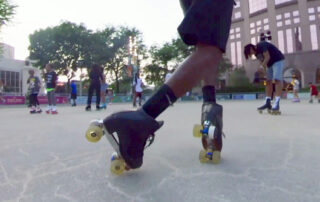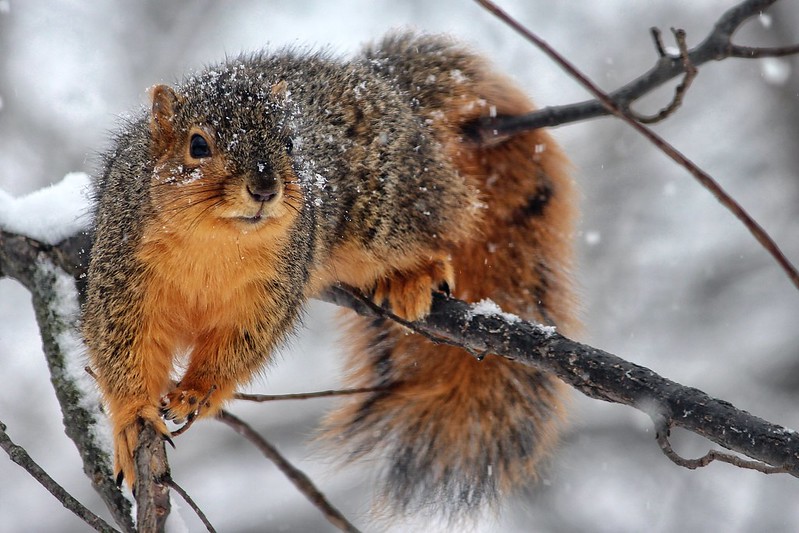Wisconsin Life will feature several stories written by northern Wisconsin residents about the Penokee Range. The stories are the product of the event “Penokees Read”, a public reading of stories and poetry about the living, working, and recreating in the Penokee Hills.
“These are the oldest mountains in the world,” so my stepfather would say.
We floated through a gorge on the Brunsweiler. He would raise his eyebrows at the etched granite face mottled with crevices and lichens. The Johnson-Evinrude’s seven-point-five horses puttered. They echoed. Two-cycle engine vapors mixed with second-hand smoke and held within the pocket canyon.
Black lichens, brown, pale green with white, orange lichens, vibrated a visual echo of their own. Their lines swayed and danced like a Johnny Carson jacket his producer didn’t have the stones to tell him not to wear because of what the pattern would do to the camera.
You remember Johnny’s producer. Fred De Cordova. Johnny would joke about his age. Fred got upset because all that tea was wasted in the harbor; Fred looks like a million…every day of it.
My stepfather steered the pontoon with his loafer, his shin covered in a black dress sock. He would lift his martini to his lips, level his gaze at my brothers and me, and extend his pinkie on the tumbler because he knew it made us squirm.
“I’m not always right,” Louie would say, “but I’m never wrong.”
Then came his winning chortle and jutting jaw, FDR-style.
And he always was right – about FDR, about the Falkland Islands, about my mom.
If we doubted him, “These mountains are more than two billion years old. Old, old. Worn down by wind and weather, everything that ages. Water, ice, grit. Part of the Laurentian Shield.” He said ‘Laurentian’ with an aristocratic trip of the tongue. He made it clear. He spoke from authority.
That was forty-five years ago.
Before Google.
Back then, trusting in the knowledge of the man my mom had trusted with her three sons was so much easier than searching out a musty encyclopedia on a dark bookshelf. I wondered where one would ever begin to look up “the oldest mountains in the world.”
It’s been a score and five years since the Pall Malls finally took Louie. About fifteen years ago I got my learner’s permit on the Information Superhighway. Ten years ago I fell in love with search engines.
At least another year or two after discovering the magic of algorithms, I got the temerity to question the knowledge of the man whose ashes we had tossed off a twenty-foot precipice with icicles as big as a boat. Decades before he died, this particular crag of exposed bedrock was known as “Louie’s Tombstone.” Always had been, always will be.
Type in – no; we ‘enter’ now – we don’t ‘type in.’ Enter: “oldest mountains in the world.”
www.wikipedia.org/North_Georgia
What? Georgia?
answers.yahoo.com… > Science & Mathematics
Mathematics? Really?
“The Zuni Mountains in New Zealand are the oldest.”
“The Urals.”
“Most scientists agree the Barberton Greenstone belt in eastern Africa….”
*Burn off some of your stomach fat by following this one weird tip.*
“It depends on how we define mountain range….”
There. See.
“The pyramids,” answered a smart mouth.
Another said the Himalayas because, like, they’re in India, man, which is, like, really old. More ancient than anything…. He forgot to say “dude.”
“Older still are the Killarney Mountains of Canada, Wisconsin, and Minnesota…”
*What is your Lindsay Lohan IQ?*
Wait. What was that?
“But the oldest mountains can look upon the Killarneys as mere children.”
Huh?
“These most ancient of ancients arc the Laurentians…. Wind and weather have long since worn away their proud crowns…. This range was lifted up in a great tableland — the Laurentian Plateau.”
*Do These 7 Things and You’ll Get Alzheimer’s*
wisconline.com/Geography
“… sedimentary rocks show that these mountains are among the oldest in the world….”
“The Penokee (Gogebic) Iron Range is an 80 mile long, 2.2 billion year old geographic structure in Northwest Wisconsin….”
*5 Signs You’ll Get Cancer*
Louie – Louie Hanson; J. Louis Hanson — was not always right. But, he was never wrong.
By Phil Sorensen







